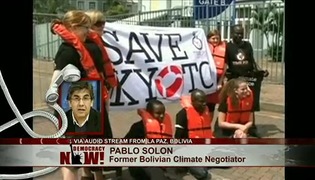
Related
Guests
- Marc Moranopublisher of the Climate Depot, a website run by the organization Committee for a Constructive Tomorrow (CFACT).
- Patrick BondSouth African climate activist and professor. He is the director of the Centre for Civil Society at the University of KwaZulu-Natal in Durban. He is author of two new books, Durban’s Climate Gamble: Playing the Carbon Markets, Betting the Earth and Politics of Climate Justice: Paralysis Above, Movement Below.
- Pablo SolonBolivia’s former ambassador to the United Nations. He also served as Bolivia’s chief negotiator on climate change.
On Wednesday, a group of climate change deniers praised the Obama administration’s refusal to support an extension of the Kyoto Protocol or an agreement on binding emissions cuts. Democracy Now! caught up to Marc Morano, publisher of the Climate Depot, at the U.N. Climate Change Conference in Durban, South Africa. “They [the Obama administration] have kept the exact same principles and negotiating stance as President George Bush did for eight years,” Morano says. “Obama has carried on Bush’s legacy. So, as skeptics, we tip our hat to President Obama in helping crush and continue to defeat the United Nations process. Obama has been a great friend of global warming skeptics at these conferences.” [includes rush transcript]
Transcript
AMY GOODMAN: Interestingly, on Wednesday, a group of climate change deniers held a news conference here at the U.N. climate change summit in Durban. Speakers included Marc Morano, publisher of the “Climate Depot,” a website run by the organization Committee for a Constructive Tomorrow, or CFACT. I spoke to Marc Morano just before this broadcast and asked him about President Obama.
MARC MORANO: His nickname is “George W. Obama.” Obama’s negotiator, Todd Stern, will be here today. They have kept the exact same principles and negotiating stance as President George Bush did for eight years. Obama has carried on Bush’s legacy. So, as skeptics, we tip our hat to President Obama in helping crush and continue to defeat the United Nations process. Obama has been a great friend of global warming skeptics at these conferences. Obama has problems, you know, for us, because he’s going through the EPA regulatory process, which is a grave threat. But in terms of this, President Obama could not have turned out better when it came to his lack of interest in the congressional climate bill and his lack of interest in the United Nations Kyoto Protocol. So, a job well done for President Obama.
AMY GOODMAN: That was, interestingly, Marc Moreno of CFACT, which is the climate change denier group, saying that President Obama is basically their best ally, “George W. Obama.” Ambassador Pablo Solón, what do you make of this?
PABLO SOLÓN: Well, when Obama came into the presidency in the U.S., in Latin America and Bolivia there was a lot of expectation, a lot of hope. But it’s true. After all these years, we can say nothing has changed. And even the politics of the U.S. in relation to climate change has went worse and worse, because we don’t see at all an initiative from the side of the U.S. to push for a stronger deal that has to meet the great problems of climate change.
AMY GOODMAN: Talk about what is happening here. I mean, a text released yesterday, what actually will happen tomorrow, it seems like they’re just sort of playing the clock out to try to prevent anything real from taking place by the end. And then the politics of China. I mean, you were an ambassador. You were the chief climate change negotiator. You know China is a key player here, the number one emitter of greenhouse gas emissions, even if the U.S. is number one—is more of a greenhouse gas emitter per capita than China. The U.S. continually uses China to say, if they’re not going to abide by mandatory emissions reductions, you know, we are not going to move forward in that direction, either.
PABLO SOLÓN: We’re 36 hours before this closes. And until now, the real document that’s going to be adopted, nobody knows it. It’s being negotiated in very small meetings outside this venue. The real outcome will appear the last minute. In Copenhagen, it appeared at 2:00 a.m., one day after the last day of the meeting. In Cancún, it appeared at 5:00 p.m. the last day of the meeting.
AMY GOODMAN: And most of the negotiators, most of the countries, know nothing about it?
PABLO SOLÓN: They know that that’s happening, but they don’t do nothing about it.
In relation to the other question, China has put a pledge, a pledge that—I have spoken with Jonathan Pershing, with the European Union negotiators, and asked them, “Is the pledge of China not enough or not good for you?” And they—
AMY GOODMAN: Right, China is saying that they would cut greenhouse gas emissions.
PABLO SOLÓN: Yeah, they have made—China, South Africa, Brazil—a pledge. In total, they are going to cut, by the year 2020, five gigatons of CO2. All Annex I parties, including the U.S. and Europe, are only going to cut 3.1 gigatons. So, the question was, “That is not enough? Are you asking for more? Even though five is more than three?” And they say, “No, we agree that that’s OK with China. What we want from China is that China agrees for a mechanism to verify that that’s really going to be done.” But that’s not the case of the U.S., because in the case of the U.S., the figure is too low. That is not only a problem of—that we want to have some kind of verification. We need to increase that number, because they are the second emitter now, but historically, they are far away the most important emitter.












Media Options